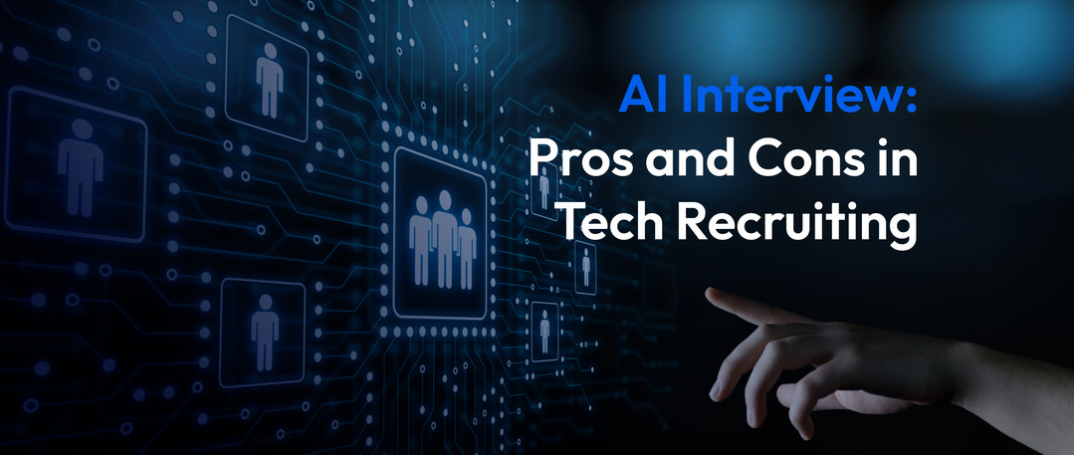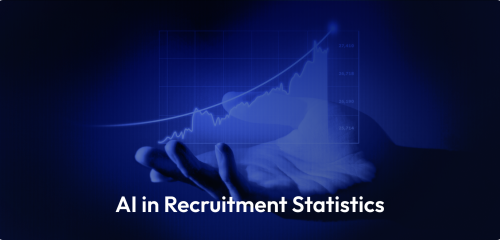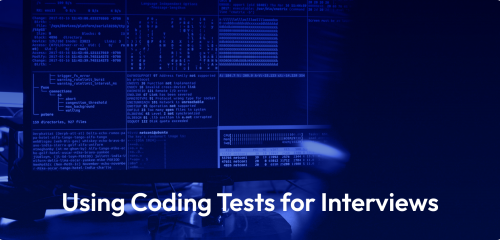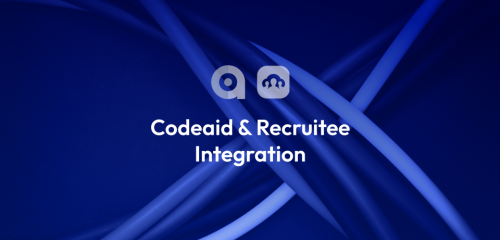Gone are the days when recruiting was solely about handshakes and paper resumes.
The tech world is abuzz with AI-driven recruitment tools, a trend tracing back to early digitization efforts. These tools promise swift, unbiased hiring, harnessing vast data streams to pick the best of the best.
Yet, every silver lining has its cloud.
While AI streamlines the hiring maze and minimizes human error, it sparks concerns over depersonalization and potential biases.
Dive in as we unpack all the pros and cons of using AI in the tech recruiting realm.
Key takeaways
- AI in recruiting can enhance candidate engagement, offer data-driven insights, and streamline the entire recruitment process.
- When hiring developers, AI can simulate real-world coding challenges, provide actionable insights for job listings, and even aid in reducing biases.
- However, there are concerns regarding over-reliance on AI, potential biases in AI systems, and the risk of missing out on unconventional talents.
- Striking the right balance between automated AI processes and human intuition is vital.
What is AI in Recruiting?
AI in recruiting is about leveraging machine intelligence to enhance and automate the talent acquisition journey. AI software solutions fuse data analysis and predictive algorithms that help recruiters easily spot the ideal candidate from a sea of applicants.
From auto-screening resumes and detecting potential bias in job descriptions to gleaning actionable insights from the avalanche of data in an Applicant Tracking System, AI is reshaping the recruiter’s toolkit. This helps HR teams delegate the majority of manual tasks to AI so they can focus on what really matters – evaluating the nuanced skills and cultural fit of potential tech talents.
Pros and Cons of AI in Recruitment
The tech sector stands out as one of the most dynamic and competitive industries, with companies vying for the best developers in the market. In fact, 27% of hiring managers report that the top-notch candidates they hire often receive offers from multiple employers.
To succeed, businesses must not only identify top talent but do so swiftly before they’re snatched up by competitors.
Benefits of AI in Recruitment
AI recruiting software is a game-changer in this arena, offering distinct advantages tailored to the unique demands of tech recruiting.
Here are some of the benefits of AI in recruitment:
AI pro #1: Speeds Up the Screening Process
On average, recruiters spend about 30 hours a week on admin tasks like sourcing candidates, reviewing CVs, and scheduling interviews. But with AI recruitment tools, this doesn’t have to be the case anymore.
By harnessing the power of machine learning, AI tools can quickly parse through vast volumes of resumes, filtering out the most promising developer candidates. This eliminates hours, if not days, of manual screening, ensuring that talent acquisition teams can move at a pace that keeps up with the rapid tech industry.
AI pro #2: Reduces Bias in Selection
About 48% of hiring managers say that bias affects their candidate selection.
The good news?
AI-powered tools, when well-trained, provide a level of objectivity that’s hard to achieve manually. By analyzing candidates based solely on skills and experiences relevant to the tech role, businesses can ensure they’re giving equal opportunities to all candidates. This way, recruiters can focus on candidate skills and role fit, avoiding any unconscious biases.
AI pro #3: Tailored Skill Matching
Especially crucial in tech recruiting, AI can precisely match candidate skills to job requirements. Whether it’s proficiency in a specific programming language or experience with certain software, AI tools can detect and highlight these nuances, ensuring the best fit for developer roles.
AI pro #4: Enhanced Candidate Engagement
Interacting with tech-savvy candidates requires leveraging modern tools. AI chatbots and automated systems can engage developers in real time, answering queries, scheduling interviews, or even administering coding tests. This ensures a smooth and interactive recruitment experience, increasing candidate engagement.
AI pro #5: Data-Driven Decisions
AI tools offer analytics and insights that can guide recruitment strategies. By understanding which channels bring in the most qualified developer candidates or which job descriptions resonate the most, businesses can fine-tune their approach, ensuring optimal results in future tech recruitment drives.
Furthermore, this data-driven approach can reveal hidden patterns, enabling companies to preemptively address challenges and capitalize on opportunities in the tech hiring landscape.
Disadvantages of AI in Recruitment
The integration of AI in recruitment, while revolutionary, isn’t without its setbacks.
Especially when hiring technical talent such as developers, the nuances and subtleties of the process might not always align with what AI tools offer.
Here’s a breakdown of some of the disadvantages and specific challenges organizations may face when using AI in tech recruiting:
AI con #1: Over-Reliance on Algorithms
AI tools, while sophisticated, are bound by the data and algorithms they rely upon. For developer roles that require specific niche skills or experience, a machine might overlook a candidate who doesn’t match the algorithm’s criteria but is a cultural fit or has the potential for on-the-job growth.
AI con #2: Lack of Human Touch
AI might streamline processes, but interpersonal relationships still play a pivotal role in hiring. Developers, often in high demand, value genuine human interactions and feedback. Over-automation might deter some candidates who feel like they’re just another number in an automated system.
AI con #3: Misinterpretation of Soft Skills
Soft skills, like team collaboration or problem-solving, are vital for developers. However, AI might not effectively gauge these qualities through resume screening or automated interviews, potentially missing out on candidates who excel in these areas.
AI con #4: Data Privacy Concerns
Tech professionals are more aware of data privacy concerns. Using AI tools that collect and analyze vast amounts of personal data can raise concerns among potential candidates, possibly affecting their willingness to apply or trust the hiring process.
Tips on Using AI Recruiting Technology for Your Organization
The wave of AI in recruitment is undeniable, offering promising avenues to discover hidden talents and streamlining hiring processes. For organizations with a focus on hiring top-notch developers, it’s crucial to tailor AI recruiting tools to match the unique dynamics of the tech world.
We have a complete AI recruiting guide to help you make the most of it, but here are some key tips to consider:
Use AI to Simulate Real-world Coding Challenges
Instead of standard pre-defined coding tests, utilize AI to generate dynamic coding challenges that mirror real-world tasks your developers encounter daily.
For instance, if your company specializes in developing e-commerce platforms, challenge candidates with AI-generated tasks that revolve around creating specific e-commerce functionalities. This ensures a more accurate gauge of their skills and fit for the role.
Employ Natural Language Processing for Better Job Listings
NLP can analyze hundreds of developer job listings to identify the most engaging terms and phrases. For instance, mentioning “cutting-edge tech stack” or “collaborative coding environment” might garner more interest.
Leverage this knowledge to craft job descriptions that resonate more effectively with potential developer candidates.
Automate the Initial Screening, But Keep Human Touch in Final Rounds
You can let AI handle the initial parsing of resumes and coding test evaluations to ensure no worthy candidate slips through.
However, for the later stages, maintain a human touch, especially for roles requiring strong team collaboration or specific soft skills, ensuring that potential hires align with your company culture and team dynamics.
Ensure Continuous Learning for Your AI Systems
The tech recruiting landscape is always evolving. Make sure your AI recruitment tools are continuously learning and updating.
For instance, if a new programming language gains traction, your AI should recognize and prioritize it, ensuring you stay at the forefront of tech talent acquisition.
Monitor for Unintentional Bias
Ensure your AI systems aren’t inadvertently favoring certain demographics over others. Continuously check its decision-making criteria, especially when filtering developer candidates.
For instance, if you find it disproportionately screens out candidates who attended certain institutions or come from particular regions, adjust its algorithms to foster a more diverse and inclusive hiring process.
Conclusion: Navigating AI in the Hiring Process
As AI continues to redefine the landscape of tech recruiting, organizations are presented with both unparalleled opportunities and new challenges.
Leveraging AI tools can tremendously optimize the hiring process, ensuring companies onboard the best developer talent efficiently. Yet, it’s imperative to approach AI with a discerning eye, considering both its advantages and potential pitfalls.
With these insights in mind, consider how Codeaid can further bolster your recruitment efforts. Our AI Interviewer feature is tailored for tech recruiting, ensuring you find the perfect developer fit for your team. Dive in and experience a future-ready hiring process today.



